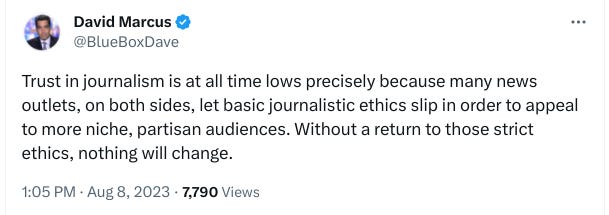E-Pluribus | August 9, 2023
Freedom to read . . . but with an asterisk; you can't build community with scorched earth policies; and forget the book bans — save the library.
A round-up of the latest and best writing and musings on the rise of illiberalism in the public discourse:
George Packer: The Three Attacks on Intellectual Freedom
It’s not as if ideas cannot be dangerous, but George Packer writes at The Atlantic that suppressing ideas, even with decent motives, can be arguably even more dangerous. While Packer cites government efforts to regulate books and publishing as clearly problematic, he asserts the threats from within (as I wrote for Pluribus two years ago) are even more insidious.
In June 1953, at the height of the McCarthy era, while congressional investigators and private groups were hunting down “subversive” or merely “objectionable” books and authors in the name of national security, the American Library Association and the Association Book Publishers Council issued a manifesto called “The Freedom to Read.” The document defended free expression and denounced censorship and conformity in language whose clarity and force are startling today.
[ . . . ]
This past June, the library and publishers’ associations reissued “The Freedom to Read” on its 70th anniversary. Scores of publishers, libraries, literary groups, civil-liberty organizations, and authors signed on to endorse its principles. And yet many of those institutional signatories—including the “Big Five” publishing conglomerates—often violate its propositions, perhaps not even aware that they’re doing so. Few of them, if any, could produce as unapologetic a defense of intellectual freedom as the one made at a time when inquisitors were destroying careers and lives. It’s worth asking why the American literary world in 2023 is less able to uphold the principles of “The Freedom to Read” than its authors in 1953.
[ . . . ]
“There is more than one way to burn a book,” Ray Bradbury once said. “And the world is full of people running about with lit matches.” The second threat to intellectual freedom comes from a different source—from inside the house. This threat is the subject of a new report that PEN America has just published, “Booklash: Literary Freedom, Online Outrage, and the Language of Harm.” (Because I have written about censorship and language in the past, PEN asked me to read and respond to an earlier draft and gave me an advance copy of the final version.) The report is focused on the recent pattern of publishers and authors canceling their own books, sometimes after publication, under pressure organized online or by members, often younger ones, of their own staffs. PEN has tracked 31 cases of what might be called literary infanticide since 2016; half occurred in just the past two years. “None of these books were withdrawn based on any allegation of factual disinformation, nor glorification of violence, nor plagiarism,” the report notes. “Their content or author was simply deemed offensive.”
[ . . . ]
A skeptic might ask why a few dozen awkward decisions and minor controversies out of tens of thousands of books published every year should matter. The answer is that these incidents reveal an atmosphere of conformity and fear that undermines any claim book publishing has to being more than just a business. Most of the canceled books described in the report are victims of a pervasive orthodoxy. At its most rigid, this orthodoxy puts the claims of identity above everything else—literary quality, authorial independence, the freedom to read. Its reach can be seen in how many of the canceled books were already making obvious, if clumsy, efforts to abide by the values of equity and inclusion; and in Natasha Tynes’s attempt to defend herself from online attacks by pleading that she herself is “a minority writer.”
Eventually, orthodoxy makes the suppression of books unnecessary because it leads to self-censorship by editors and writers. One canceled author interviewed by PEN said, “It has shut me down, creatively. There is always a censor, perched on my shoulder, telling me I cannot write about this or that topic.” What writer can honestly say it isn’t true of them? Almost none of the editors interviewed for the PEN report were willing to be quoted by name. What are they afraid of, if not the fate of their authors?
Read it all.
Ben Klutsey and David Schmidtz: Understanding Community Through Moral Science
Discourse Magazine's ongoing series on liberalism features an interview by Ben Klutsey, from the Mercatus Center at George Mason University, with West Virginia University professor David Schmidtz. Schmidtz discusses his concept of "moral science," which explores the factors that influence our decision-making and behavior in society. As part of a continuing series at Discourse Magazine on liberalism, Part of their discussion centered on the impulse to win arguments rather than persuade.
KLUTSEY: In the book you say that “one aspect of liberalism is an insight that community life is not zero-sum and that one person’s gain does not imply another’s loss.” One line that I find really insightful is that “the adult political ideal is not to avoid losing, but to avoid needing other people to lose.” Can you elaborate on that?
SCHMIDTZ: Thank you for picking up on that. I don’t know, maybe I should just leave that the way it is. But I do think that’s related, of course, to your polarization question. There is a massive tendency to exaggerate those aspects of our relationships that are zero-sum. Those things are just more salient to our psychologies. Those are the things that grab our attention because it’s this game that’s going to decide whether I’m a winner or a loser. Being a cooperator, what’s that? It isn’t as good as being a winner. We exaggerate the extent to which the situations that we’re in are zero-sum.
There’s always a bigger picture that you can look at. There’s a narrower picture that you can look at and you can say, “There was a zero-sum aspect to that competition. I wanted a specific thing, and I didn’t get that. But on the other hand, I lived in a country which didn’t impose the death penalty for losing.” I’ll say, the real upshot of me not getting what I wanted in 1988 was that I got to do this instead. I have to say, if I had to go back and do it all over again, I’m not sure I’d even want to win that one, given the benefits of the path I took.
There’s a bigger, maybe a more adult picture where you see that maybe the genius of a community, the success criterion for a society is to put people in a position where losing works out pretty well. If it’s win or die, then we’re in an emergency situation. Then we’re doing everything we can to hurt the people around us. If your psychology is shaping up like that, if it’s twisting you in that direction, then you become a person that other people don’t want as neighbors, they don’t want as friends, they don’t want as family members. If you can say, “I can walk away from that meeting with my president and not get what I wanted,” and still say, “It’s going to be okay, though. I didn’t get what I said I wanted, but I didn’t lose what I needed either.”
Read the whole thing.
Kat Rosenfield : The Burning of America's Library
One can hardly get through a day lately without running across an accusation of “book banning,” but author Kat Rosenfield writes at her Pirate Wires Substack that not only are many of these charges overblown, but that actual book banning is virtually impossible in the digital age. Besides, Rosenfield argues, focusing on individual books obscures the larger problem which she identifies as the loss of a neutral space (i.e., libraries) for ideas of all kinds.
Indeed, in the digital age, the only way to even come close to a true-blue book ban is to stop it at the source, by preventing the book from being written or published. By the time you're talking about limiting its distribution in a library setting, you're not really fighting about the book anymore. You're engaged in a bigger, uglier power struggle for the soul of the library itself. Which brings us to this: It's not about the books
This is perhaps the most important context missing from the "book banning" discourse: absolutely none of this is about the books themselves. This is also the good news: despite the efforts of folks on both sides of the political aisle, and despite the enormous amount of ink spilled about the scourge of book bans, the actual content of most school libraries — even the ones in Florida — remains truly and wildly diverse in the original sense of the word. For every explicitly ideological YA book aimed at gender-questioning or LGBT youth, there's a slew of ordinary coming of age novels, faith-based books about troubled Christian teens, and no shortage of deeply unwoke heterosexual smut for the brazen few who are both nerdy and horny enough to go digging through the stacks for Flowers in the Attic or Clan of the Cave Bear (a.k.a. every school library's true, albeit silent constituency).
Instead, this is a conflict centered on the library as a public institution — and more specifically, on what happens when one of those institutions abandons political neutrality as a core value. We've already seen how this has played out in media and academia, how the perception of political partisanship leads to a catastrophic loss of trust. As the columnist Megan McArdle notes, "It turns out that if you treat your profession as an explicitly political project, people will extend your profession the same trust they extend politicians."
People also begin to see your institution as reasonably subject to the rules of representative democracy. Politicize the library, and people will demand a vote. After all, who does the library belong to? Who is it for?
There was a time when the answer to that question was unequivocal. To quote a poster that used to hang on the wall of the public library in my upstate New York hometown, "Everyone is welcome at the library!" But today, with libraries operating as part-time political provocateurs, hosting drag queen story hours and staging exhibits of violence-tinged and explicitly ideological art, the answer is more like a riff on Orwell: Everyone is welcome at the library, but some are more welcome than others.
Read it all here.
Around Twitter
Zaid Jilani on the conflicting priorities of Hollywood studies:
Dave Marcus on the negative effect of side-taking on journalism:
And finally, a reminder that word games don’t actually solve problems:











